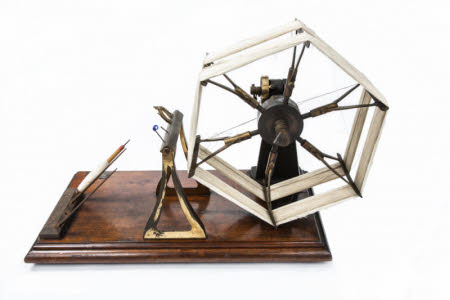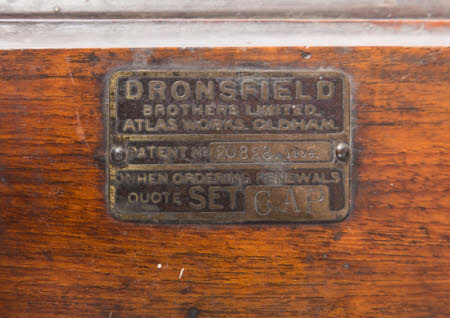Wrap wheel
Category
Machinery and industrial devices
Date
Unknown
Materials
Order this imageCollection
Quarry Bank, Cheshire
NT 1454070
Caption
Lancashire dominated the global production and trade of cotton textiles during the 19th and early 20th centuries, with the industrial city of Manchester nicknamed ‘Cottonopolis’. Imported cotton harvested by enslaved people was twisted or spun into a strong yarn, which was woven into cloth. Mills such as Quarry Bank – founded by entrepreneur Samuel Greg (1758–1834) in 1784 – used newly invented water- and steam-powered machines to spin yarn and produce cloth in huge quantities. With new industry came new challenges, because some merchants supplied poor-quality or ‘short-reeled’ yarn. Testing houses were established to regulate the yarn and cloth to required standards, with new scientific instruments developed to measure the strength, weight and twist-count of textiles. By the 1890s, Quarry Bank had its own testing room to quality-check incoming and outgoing yarn and cloth. This wrap wheel would have been a standard piece of equipment. When the handle was turned, a pre-determined length of yarn was wound evenly around the frame, and could then be assessed and weighed. A mechanical counter showed the number of rotations. This wheel was made locally by Dronsfield Brothers in Oldham, and the design was patented in August 1916.
Summary
Wrap wheel made by Dronsfield Brothers of Atlas Works. A brass wheel sits on a wooden base and a wooden handle turns the wheel drawing the yarn from four tubes.
Full description
Wrap wheels were part of the standard equipment expected of testing rooms during the late-nineteenth century. The wrap wheel drew yarn out of cops or bobbins evenly without overlapping and was used to prepare yarn for tests such as weighing, determination of count and strength. Bobbins were placed on the yarn cone stand and the yarn was passed through a tensioning device while a mechanical counter showed rotations. As the yarn wrapped around the wheel it was evenly spaced, allowing for easy examination of quality, length and weight. Some wrap wheels contained measuring devices such as quadrant scales to check the weight and length of yarns without having to use additional apparatus. Dronsfield Brothers of Atlas Works, Oldham were a firm of machine makers founded in 1860. In May 1915, James Dronsfield filed an application for patent on his ‘detachable jacks’ for rotating shafts, of which the pictured is a specification. It was patented in August 1916.

